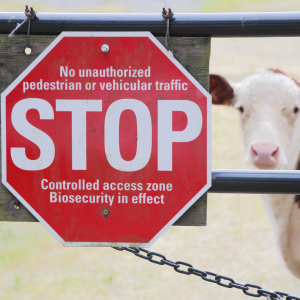 While reviewing animal health articles from the U of A Division of Agriculture, one word consistently stood out: Biosecurity. But what exactly is it, and why is it so vital?
While reviewing animal health articles from the U of A Division of Agriculture, one word consistently stood out: Biosecurity. But what exactly is it, and why is it so vital?
Biosecurity refers to procedures designed to protect humans or animals from disease or harmful biological agents.
In practice, biosecurity encompasses a range of preventive measures—from physical barriers and rigorous hygiene to operational protocols—all aimed at preventing the introduction and spread of biological threats to people, animals, and plants.
The Importance of Biosecurity:
- Protects Animal Health: It prevents infectious disease transmission among animals, significantly reducing mortality, morbidity, and economic losses for farmers and producers.
- Safeguards Human Health: By controlling animal diseases, biosecurity defends human health against zoonotic illnesses transferable from animals.
- Preserves Environmental Integrity: These measures are crucial in preventing the introduction and spread of invasive species and pathogens that can harm ecosystems and disrupt biodiversity.
- Supports Sustainable Agriculture: Maintaining healthy livestock and crops through biosecurity contributes directly to sustainable agricultural practices and food security.
- Protects International Trade: Biosecurity ensures agricultural products and animals meet global standards, facilitating trade and preventing cross-border disease transmission.
- Reduces Economic Impact: By minimizing the risk of disease outbreaks, biosecurity helps mitigate severe economic consequences such as production losses, trade restrictions, and damaged consumer confidence.
In essence, biosecurity is fundamental for protecting the health of animals, humans, and the environment, fostering sustainable agriculture, and shielding the economy from devastating biological threats.



